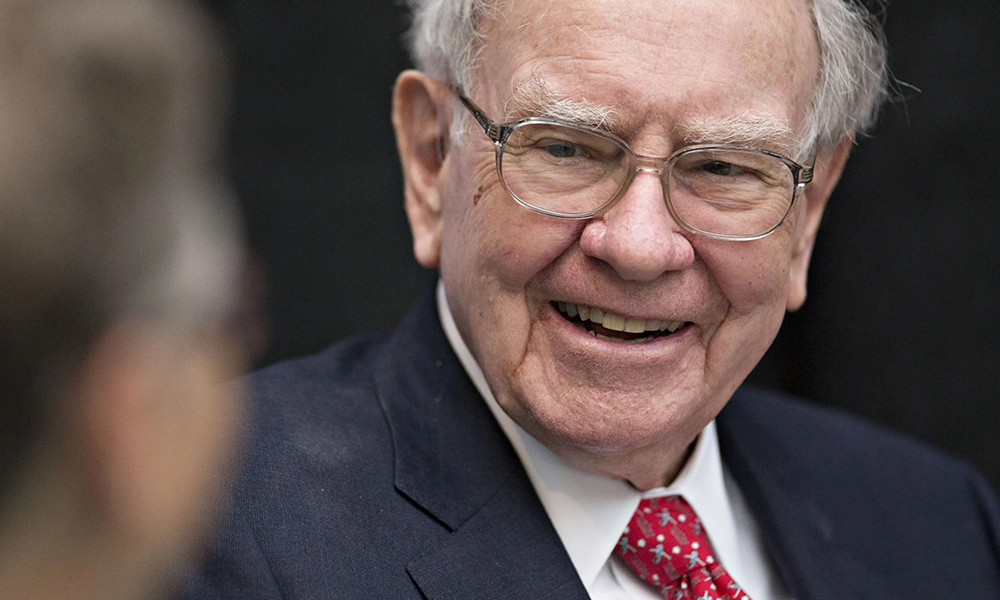
傳奇控股公司伯克希爾·哈撒韋公司(Berkshire Hathaway)的億萬富翁首席執(zhí)行官沃倫·巴菲特(Warren Buffett)始終堅(jiān)信,,最優(yōu)秀的領(lǐng)導(dǎo)者是那些致力于培養(yǎng)未來繼任者的人,,以及那些有堅(jiān)定方向感的人,。
在2015年的伯克希爾·哈撒韋年度股東大會上,,巴菲特對《財富》雜志的蘇茜·加里布表示:“你必須對自身的發(fā)展路徑有清晰的規(guī)劃,才能引領(lǐng)他人前行,?!彼嬖V加里布,,伯克希爾·哈撒韋公司擁有“眾多”下一代領(lǐng)導(dǎo)人?!叭瞬艃涑渥?。”
巴菲特說,,為了使這些領(lǐng)導(dǎo)者投身于并致力于公司的使命,,他和已故副董事長查理·芒格(Charlie Munger)試圖“通過文字和言論來塑造一種強(qiáng)大的文化——查理亦是如此?!?/p>
巴菲特說:"歸根結(jié)底,,我們希望人們認(rèn)同伯克希爾的文化?!?/p>
至于人們是否可以通過訓(xùn)練成為杰出的領(lǐng)導(dǎo)者——與天生就具備相應(yīng)特質(zhì)和正確方向的人相對——巴菲特持折中的觀點(diǎn)。
他告訴加里布:“我認(rèn)為這是天賦與后天學(xué)習(xí)的結(jié)合,。有些人天生就具備更多領(lǐng)導(dǎo)特質(zhì),,但我認(rèn)為你也可以學(xué)到很多知識?!?/p>
只聘用優(yōu)秀人才
數(shù)十年來,,巴菲特與芒格始終不遺余力地頌揚(yáng)卓越管理和精準(zhǔn)招聘的優(yōu)點(diǎn)。
在2014年接受《財富》雜志采訪時,,時任特約編輯的帕蒂·塞勒斯(Pattie Sellers)寫道,,伯克希爾·哈撒韋公司遵循的原則是避免收購那些管理不善的公司。這是不同尋常的,。她說:“很多人傾向于收購那些管理不善但潛力無限的公司,,隨后替換其管理層?!?/p>
這對芒格和巴菲特來說并非良策,。巴菲特對塞勒斯說:“我們曾嘗試過這種做法,結(jié)果可想而知,?!彼€補(bǔ)充說,與天生優(yōu)秀的人合作,,而不是耗費(fèi)心力試圖將不勝其任的管理者轉(zhuǎn)變?yōu)樽繝柌蝗旱墓芾碚?,“生活會有趣得多”?!拔业囊馑际?,誰愿意耗費(fèi)一生試圖改變他人的本性呢?”
巴菲特接著說:"與某人結(jié)婚力求改變對方是瘋狂的,,雇傭某人并期望改變他也同樣是瘋狂之舉,,而與某人合作并試圖改變他亦是如此,。”
芒格也贊同這種觀點(diǎn),。他在2017年密歇根大學(xué)(University of Michigan)的一次活動上表示:“伯克希爾作為一家大型企業(yè)集團(tuán)之所以能取得成功——據(jù)我所知,,它比其他任何大型企業(yè)集團(tuán)都要成功——是因?yàn)槲覀冊噲D收購那些不需要總部過多管理干預(yù)的公司。其他人都認(rèn)為自己擁有很多總部的管理人才,,這是非常自負(fù)的表現(xiàn),。”
1998年,,巴菲特對佛羅里達(dá)大學(xué)(University of Florida)的工商管理學(xué)碩士學(xué)生說,,他在招聘時注重三個品質(zhì):正直、智慧和精力,。他補(bǔ)充說,,這三者同樣重要?!叭绻麘?yīng)聘者不正直,,你寧愿他們愚笨懶惰?!?/p>
有些事情不會隨著時間的推移而改變,。在2021年的股東大會上,巴菲特表示,,管理不善是公司面臨的最大威脅,。“你可能會聘請一個人,,無論男女,,來管理公司——他們風(fēng)度翩翩,深受董事們喜愛——盡管并不清楚自己的職責(zé)所在,,但是擅于偽裝,。這是最大的威脅?!保ㄘ敻恢形木W(wǎng))
譯者:中慧言-王芳
傳奇控股公司伯克希爾·哈撒韋公司(Berkshire Hathaway)的億萬富翁首席執(zhí)行官沃倫·巴菲特(Warren Buffett)始終堅(jiān)信,,最優(yōu)秀的領(lǐng)導(dǎo)者是那些致力于培養(yǎng)未來繼任者的人,以及那些有堅(jiān)定方向感的人,。
在2015年的伯克希爾·哈撒韋年度股東大會上,,巴菲特對《財富》雜志的蘇茜·加里布表示:“你必須對自身的發(fā)展路徑有清晰的規(guī)劃,才能引領(lǐng)他人前行,?!彼嬖V加里布,伯克希爾·哈撒韋公司擁有“眾多”下一代領(lǐng)導(dǎo)人,?!叭瞬艃涑渥?。”
巴菲特說,,為了使這些領(lǐng)導(dǎo)者投身于并致力于公司的使命,,他和已故副董事長查理·芒格(Charlie Munger)試圖“通過文字和言論來塑造一種強(qiáng)大的文化——查理亦是如此?!?/p>
巴菲特說:"歸根結(jié)底,,我們希望人們認(rèn)同伯克希爾的文化?!?/p>
至于人們是否可以通過訓(xùn)練成為杰出的領(lǐng)導(dǎo)者——與天生就具備相應(yīng)特質(zhì)和正確方向的人相對——巴菲特持折中的觀點(diǎn),。
他告訴加里布:“我認(rèn)為這是天賦與后天學(xué)習(xí)的結(jié)合。有些人天生就具備更多領(lǐng)導(dǎo)特質(zhì),,但我認(rèn)為你也可以學(xué)到很多知識,。”
只聘用優(yōu)秀人才
數(shù)十年來,,巴菲特與芒格始終不遺余力地頌揚(yáng)卓越管理和精準(zhǔn)招聘的優(yōu)點(diǎn),。
在2014年接受《財富》雜志采訪時,時任特約編輯的帕蒂·塞勒斯(Pattie Sellers)寫道,,伯克希爾·哈撒韋公司遵循的原則是避免收購那些管理不善的公司。這是不同尋常的,。她說:“很多人傾向于收購那些管理不善但潛力無限的公司,,隨后替換其管理層?!?/p>
這對芒格和巴菲特來說并非良策,。巴菲特對塞勒斯說:“我們曾嘗試過這種做法,結(jié)果可想而知,?!彼€補(bǔ)充說,與天生優(yōu)秀的人合作,,而不是耗費(fèi)心力試圖將不勝其任的管理者轉(zhuǎn)變?yōu)樽繝柌蝗旱墓芾碚?,“生活會有趣得多”?!拔业囊馑际?,誰愿意耗費(fèi)一生試圖改變他人的本性呢?”
巴菲特接著說:"與某人結(jié)婚力求改變對方是瘋狂的,,雇傭某人并期望改變他也同樣是瘋狂之舉,,而與某人合作并試圖改變他亦是如此?!?/p>
芒格也贊同這種觀點(diǎn),。他在2017年密歇根大學(xué)(University of Michigan)的一次活動上表示:“伯克希爾作為一家大型企業(yè)集團(tuán)之所以能取得成功——據(jù)我所知,,它比其他任何大型企業(yè)集團(tuán)都要成功——是因?yàn)槲覀冊噲D收購那些不需要總部過多管理干預(yù)的公司。其他人都認(rèn)為自己擁有很多總部的管理人才,,這是非常自負(fù)的表現(xiàn),。”
1998年,,巴菲特對佛羅里達(dá)大學(xué)(University of Florida)的工商管理學(xué)碩士學(xué)生說,,他在招聘時注重三個品質(zhì):正直、智慧和精力,。他補(bǔ)充說,,這三者同樣重要?!叭绻麘?yīng)聘者不正直,,你寧愿他們愚笨懶惰?!?/p>
有些事情不會隨著時間的推移而改變,。在2021年的股東大會上,巴菲特表示,,管理不善是公司面臨的最大威脅,。“你可能會聘請一個人,,無論男女,,來管理公司——他們風(fēng)度翩翩,深受董事們喜愛——盡管并不清楚自己的職責(zé)所在,,但是擅于偽裝,。這是最大的威脅?!保ㄘ敻恢形木W(wǎng))
譯者:中慧言-王芳
Warren Buffett, the billionaire CEO of legendary holding company Berkshire Hathaway, has long maintained that the best kinds of leaders are those who commit to mentoring their future successors—and those with a firm sense of direction.
“You have to have a clear vision of where you’re going, so that you can get others to follow you,” Buffett told Fortune’s Susie Gharib at the Berkshire Hathaway Annual Shareholder Meeting in 2015. He told Gharib that Berkshire Hathaway has “a ton” of next-generation leaders. “There’s no shortage.”
To keep those leaders engaged and committed to the firm’s mission, Buffett said he and the late Charlie Munger, who was then the vice chairman, tried “to create a strong culture through what I write, and what I say—same thing with Charlie.”
“In the end, we want people to buy into the Berkshire culture,” Buffett said.
As for whether people can be trained to be great leaders—as opposed to simply being born with the proper traits in the proper orientation, Buffett split the difference.
“I think it’s a combination of the two,” he told Gharib. “Some people have way more leadership qualities inherently, but I think you can learn a lot, too.”
Good people only
Buffett and Munger extolled the virtues of good management—and good hiring—for decades.
In a 2014 Fortune interview, Pattie Sellers, who was editor-at-large at the time, wrote that Berkshire Hathaway as a rule refuses to buy companies run by bad managers. That’s unusual. “A lot of people like to buy good companies with bad managers and then replace them,” she said.
That didn’t work for Munger and Buffett. “We tried that, with predictable results,” Buffett told Sellers, adding that “l(fā)ife is so much more fun” when you work with people who are already good by nature—rather than expending energy trying to turn bad managers good. “I mean, who wants to spend their life trying to change people from their natural approaches?”
“Marrying somebody to change them is crazy,” Buffett went on. “And I would say hiring somebody to change him is just as crazy, and becoming partners with them to change them is crazy.”
Munger echoed the sentiment. “The reason that Berkshire has been successful as a big conglomerate—more successful than any other big conglomerate, so far as I know—is we try to buy things that aren’t going to require much managerial talent at headquarters,” he said at a 2017 event at the University of Michigan. “Everybody else thinks they’ve got a lot of managerial talent at headquarters, and that’s a lot of hubris.”
In 1998, Buffett told MBA students at the University of Florida that he looks for three things when hiring people: integrity, intelligence, and energy. All three are equally vital, he added. “If they don’t have integrity, you want them dumb and lazy.”
Some things don’t change over time. At a 2021 shareholder meeting, Buffett said bad management is the biggest threat a company could face. “You get a guy or a woman in charge of it—they’re personable, the directors like ’em—they don’t know what they’re doing. But they know how to put on an appearance. That’s the biggest single danger.”






